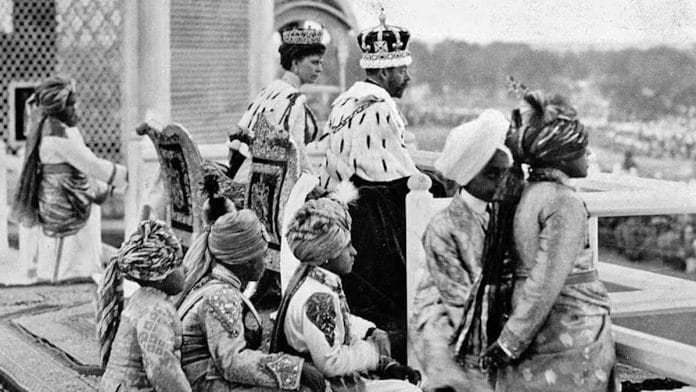Thank you dear subscribers, we are overwhelmed with your response.
Your Turn is a unique section from ThePrint featuring points of view from its subscribers. If you are a subscriber, have a point of view, please send it to us. If not, do subscribe here: https://theprint.in/subscribe/
In a world increasingly defined by contested borders and national anxieties, it is easy to forget that many of today’s fiercest territorial conflicts, whether in Kashmir, Palestine, Cyprus, or Sudan, did not arise organically. They were, in large part, the result of deliberate decisions by a retreating British Empire.
Armed with rulers, compasses, and imperial convenience, British administrators drew lines that would later ignite wars, divide peoples, and sow discord for generations.
If borders are supposed to reflect the natural contours of culture, geography, and identity, then the British approach was the exact opposite: they used borders as tools of control, fragmentation, and manipulation.
Let us consider just a few examples.
Kashmir: A Fire Lit by Partition
When India gained independence in 1947, British withdrawal from the subcontinent was hasty, messy, and tragically shortsighted. Lord Mountbatten’s rushed timeline and Cyril Radcliffe’s inexperience with Indian geography created a volatile situation. The Radcliffe Line, meant to divide India and Pakistan, not only tore apart communities but left the fate of princely states like Jammu and Kashmir in limbo.
The British gave princely states the right to choose accession but did not anticipate that Pakistan and India would go to war over Kashmir. Or perhaps they did. As some historians argue, the British aim was to create a weak, divided South Asia that would remain dependent on Western powers. Kashmir, with its strategic location and diverse demography, became an immediate flashpoint. Three wars and a frozen conflict later, the valley’s turmoil traces back to colonial indecision and engineered ambiguity.
Israel-Palestine: Partition Replayed in the Levant
In the Middle East, the legacy of British border-making is even more dramatic. The 1917 Balfour Declaration, in which Britain supported a Jewish homeland in Palestine, laid the foundation for a century of conflict. At the time, Britain had no authority to promise such a thing, Palestine was still under Ottoman rule. After World War I, the British Mandate for Palestine was established, sowing the seeds of the Israeli-Palestinian conflict.
Britain encouraged large-scale Jewish immigration while simultaneously promising Arab leaders independence. This policy of double-dealing created simmering tensions, which erupted into violence by the 1930s. By the time Britain exited in 1948, the region was a tinderbox. Again, British actions – creating and then abandoning an artificial mandate – produced a crisis with global ramifications.
Cyprus: Divide, Then Depart
Cyprus offers another telling case. Under British control from 1878 to 1960, the island experienced growing tension between its Greek and Turkish communities, exacerbated by Britain’s divide-and-rule tactics. The refusal to allow enosis (union with Greece), followed by concessions to Turkish Cypriot demands, deepened ethnic rifts.
In 1974, after a Greek-backed coup, Turkey invaded Northern Cyprus to protect Turkish Cypriots. The result was a divided island: the Turkish Republic of Northern Cyprus remains recognized only by Turkey. A unified Cyprus might have been possible if Britain had facilitated a more inclusive decolonization rather than stoking ethnic divisions to preserve strategic advantage.
Africa: The Legacy of Arbitrary Borders
The British were not alone in carving up Africa, but their border-making was especially careless. In Sudan, a single administrative entity was imposed despite clear religious and ethnic divisions between the Muslim north and Christian/animist south. This sowed the seeds for decades of civil war. South Sudan finally gained independence in 2011, but internal conflicts still reflect colonial-era administrative boundaries.
In Nigeria, Kenya, and Zimbabwe, the British lumped together rival ethnic groups under one flag, often favouring one group over another. In some cases, borders split ethnic communities across colonies, ensuring that national identities would remain fractured long after independence.
Negligence or Malice?
Were these border crises caused by ignorance or intent? Likely both. In many cases, Britain prioritized imperial expedience over long-term stability. In others, it deliberately used borders to divide and weaken post-colonial states, keeping them tethered to Western interests.
In nearly every case, the British showed little interest in understanding the social or ethnic fabric of the territories they governed. “Lines on maps” were drawn with colonial pencils, often ignoring tribes, languages, or trade routes. These artificial borders outlived the empire and continue to define the pain and politics of the post-colonial world.
A Lasting Legacy
In an era when the British Empire is sometimes remembered with nostalgia, it is worth revisiting its real legacy: a world carved up for imperial convenience, with little regard for consequence. Today’s border conflicts are not merely modern geopolitical disputes; they are echoes of an imperial past.
India and Pakistan over Kashmir, Israel and Palestine over homeland, Cyprus split by ethnic division, Sudan divided after civil war are connected chapters of a shared history, written in the ink of imperial arrogance.
To resolve these conflicts, the world must first confront where they began.
These pieces are being published as they have been received – they have not been edited/fact-checked by ThePrint.


